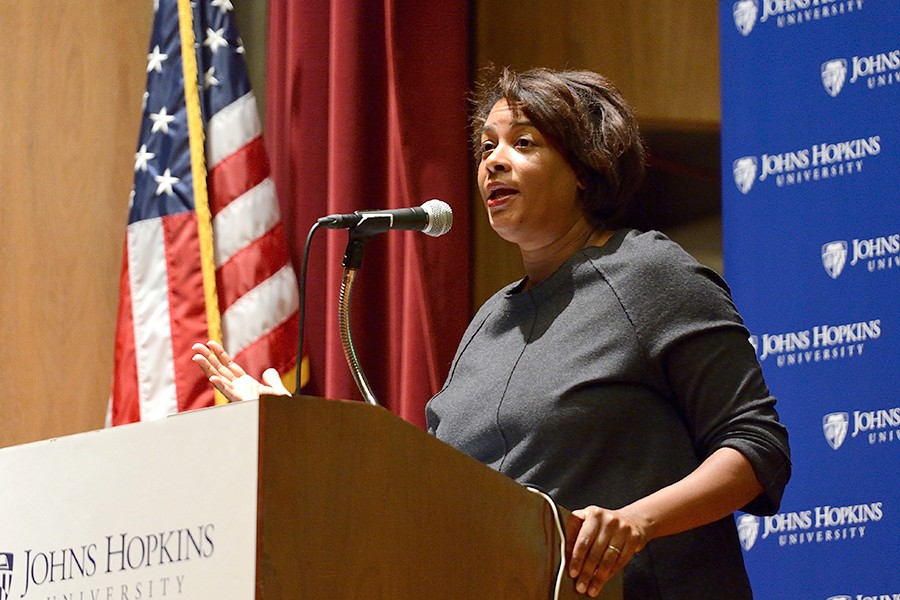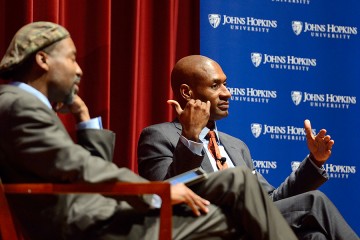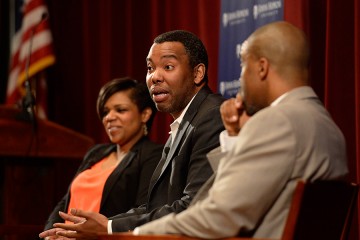While filming her documentary Gideon's Army, Dawn Porter found America's criminal justice system to be broken to the point of crisis. She calls it "our nation's greatest civil rights challenge," a line echoed by others who have experienced that system firsthand.
For the 2013 film, Porter profiled a trio of public defenders working for the poorest populations in the Deep South. The public defenders depicted in the film are themselves underpaid, chronically overworked, and struggling to retain a shred of the idealism that first motivated them to pursue careers in law.
Porter, who visited Johns Hopkins University on Wednesday for the third event in the JHU Forums on Race in America series, shared some sobering facts about the country's laws, courts, and prisons that she learned while filming Gideon's Army:
- Eighty percent of the people entering the criminal justice system are represented by public defenders, Porter said—meaning they're too poor to afford any other legal representation.
- 97 percent of those plead guilty for the crimes for which they're accused, because it's usually the least grim of their narrow options. If there's a conviction, it means the loss of rights to public housing, student loans, voting, and various federal benefits. "All of the things that would help bring you out of poverty are cut off from you," Porter said.
- The number of people in prisons in America is the highest in the world, Porter added—matched only by the number in China, a country with four times the population.
Ultimately, Porter said, "you start to see that this is a mill. People are being processed through the system without their fair day in court." This contributes directly to the "unrest and discontent and outspoken protests" America is seeing today in its high-profile racial conflicts, Porter said. "We have gotten to a crisis point where our current system is not sustainable," she added.
Porter, who heads Trilogy Films, made her way to filmmaking after a career as a corporate lawyer in Washington, D.C., and a stint on the standards and practices side of television at ABC News and A&E. The loss of a friend to ovarian cancer steered Porter toward documentaries, she said, making her think more urgently about "what my contribution to the community would be."
When she was studying at Georgetown Law, Porter said she had "very little empathy or sympathy" for public defenders, who she mostly encountered representing perpetrators of domestic abuse. Those initial impressions—which Porter said now make her cringe—evolved when she got an invitation from Jonathan Rapping, director of the Southern Public Defender Training Center, to witness a training session in Alabama. Porter found young people, "all bright and shiny and happy, and they were talking about the Constitution and they were talking about helping people."
For Gideon's Army, Porter fixed the camera on three of those young public defenders as they juggled hundreds of cases at a time—including life-or-death court trials. The documentary premiered at the Sundance Film Festival and aired on HBO.
Porter's other films include Spies of Mississippi, which tells the little-known story of a state-sponsored campaign to defeat the Civil Rights Movement in the 1960s; and Rise: The Promise of My Brother's Keeper, which explores President Obama's program to help young men of color find success.
"It's really important to be here in Baltimore having these conversations," Porter said during Wednesday's event. She also praised JHU's Black Student Union for hosting a discussion of race issues on campus earlier this week.
The JHU Forums on Race in America series was designed to spark debates on inequalities and divisions seen both nationally and in Baltimore. The first event in the series, led by acclaimed writer and Baltimore native Ta-Nehisi Coates, took place in April. Veteran New York Times columnist Charles Blow headlined the second forum in October.
Posted in Politics+Society
Tagged race relations, criminal justice, law










